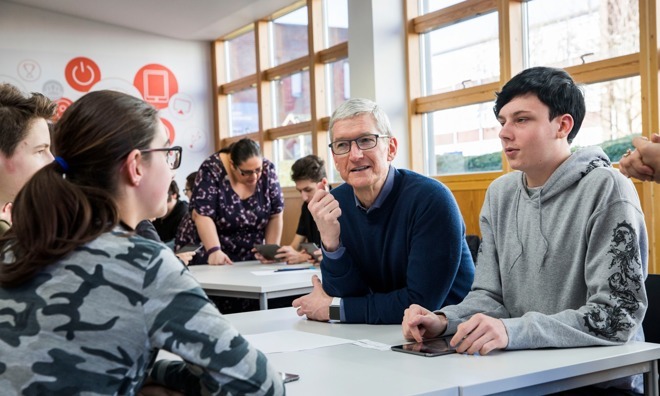During Wednesday's American Workforce Policy Advisory Board meeting in Washington, D.C., Apple CEO Tim Cook revealed some 50 percent of the tech giant's U.S. hires lacked a formal four-year college degree, using the figure as a plinth for smart education reform.
The statistic was divulged as part of Cook's introductory remarks, which were aired live on CNBC. Cook, who sat next to President Donald Trump at the meeting, opened the gathering with a brief synopsis of Apple's views on education.
"For our company, as you know, was founded by [a] college dropout, so we never really thought that [a] college degree was the thing you had to have to do well, we always tried to expand our horizons," Cook said. "To that degree, about half of our U.S. employment last year were people that did not have a four-year degree. And we're very proud of that."
Cook did not elaborate on whether the 50 percent figure encompasses both corporate and retail sector hires, but it can be assumed U.S. Apple Store staff are included in the number. Apple owns and operates more than 270 first-party outlets across the country, with employees ranging from sales specialists to managers and Genius Bar staff.
The Apple chief went on to tout the company's educational initiative, saying he believes computer coding skills will be a highly desired asset for future job seekers. In particular, Apple and other tech companies will see an increasing need for talented coders in the coming years, Cook said.
"So to that end, as we've looked at the mismatch between the skills that are coming out of colleges, and what the skills are that we believe we need in the future — many businesses do — we've identified coding as a very key one," he said. "We believe very strongly that it should be a requirement in the United States for every kid to have coding before the graduate K-12, and be somewhat proficient at it."
That refrain has been heard many times before, mostly from Cook, as Apple jockeys for a slice of the education market.
Cook detailed Apple's own coding curriculum, Everyone Can Code, which is offered to schools across the U.S. The program has been accepted by 4,000 schools and 80 community colleges, Cook said.
Apple's push into the classroom leans heavily on its proprietary Swift coding language, used to develop apps and software for iOS, macOS, watchOS and tvOS. Students are offered specialized learning tools like Swift Playgrounds, as well as dedicated hardware like iPad, Apple Pencil and Apple TV. While Apple's previous educational efforts revolved around Mac, the company over the past few years has concentrated on an iPad-based curriculum, rolling out tools like class management apps Classroom, Schoolwork and the ClassKit API.
 Mikey Campbell
Mikey Campbell







-m.jpg)






 Christine McKee
Christine McKee
 Marko Zivkovic
Marko Zivkovic
 Mike Wuerthele
Mike Wuerthele

 Amber Neely
Amber Neely
 Sponsored Content
Sponsored Content
 Wesley Hilliard
Wesley Hilliard










27 Comments
I don't have college education and I work as a software engineer for the past 20 years. I am not sure college would make any meaningful difference for me. College makes sense for certain fields but for occupations where college is not required, college is not necessarily the best path.
So Apple Retail is hiring!
College's purpose is not job training, and it shouldn't be. On the other hand, I'm not sure colleges are meeting Jefferson's ideal but it's questionable if the lack of such education is not ultimately harmful.
1818 August 4. "The objects of this primary eduction [university education] determine its character and limits. These objects are To give to every citizen the information he needs for the transaction of his own business; To enable him to calculate for himself, and to express and preserve his ideas, his contracts and accounts, in writing; To improve by reading, his morals and faculties; To understand his duties to his neighbors and country, and to discharge with competence the functions confided to him by either; To know his rights; to exercise with order and justice those he retains; to choose with discretion the fiduciary of those he delegates; and to notice their conduct with diligence, with candor and judgement; And, in general, to observe with intelligence and faithfulness all the social relations under which he shall be placed. To instruct the mass of our citizens in these, their rights, interests and duties, as men and citizens, being then the objects of education in the primary schools, whether privet or public, in them should be taught reading, writing and numerical arithmetic, the elements of mensuration...and the outlines of geography and history." Thomas Jefferson.
There are many areas where being good at what you do is more important than a diploma.
I work as a designer of fire sprinkler systems for commercial buildings pays very well, four degree no, the four year schools doesn't deem it worthwhile to teach it all on the job training, all you need is Autocad, Revit, Navis, and Bluebeam ability to get in. The same is true for hvac, Plumbing, and electrical detailers (note the jobs aren't exactly the same knowledge wise but are similar in the fact that four schools can't be bothered to teach it). Many other jobs are the same. In programing if you start early jr. high school by time you get out of high school (if you get good at it) you can get work almost anywhere where there is a niche (shortage of talent). Fire Sprinkler Design is such a field.